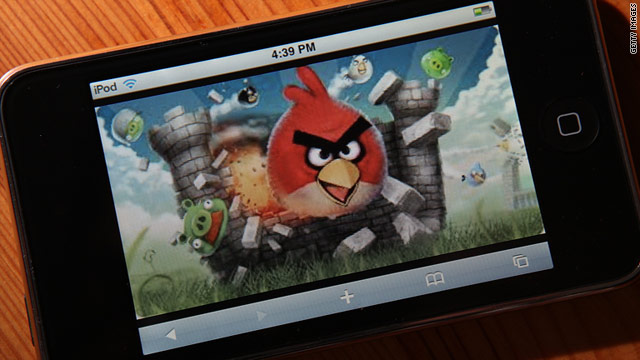
With the best games such as "Angry Birds," social games excel with the signature characteristics of gaming classics.
STORY HIGHLIGHTS
- Social games resonate because they're easy to pick up and play yet impossible to put down
- The games operate in a competitive market since nothing stops players from moving on
- Their format has tremendous potential to reach players and instantly grab their attention
RELATED TOPICS
Editor's note: Scott Steinberg is the head of technology and video game consulting firm TechSavvy Global, as well as the founder of GameExec magazine and Game Industry TV. The creator and host of online video series Game Theory, he frequently appears as an on-air technology analyst for ABC, CBS, NBC, Fox and CNN.
(CNN) -- Popular wisdom holds that because they're more intuitive, approachable and inviting than traditional video games, social games are shallow. But just as you can't judge a book by its cover, a newer, deeper breed of Facebook game is proving that you shouldn't stereotype coffee-break diversions by their sunshiny colors and doe-eyed avatars alone.
It's easy to see where misconceptions come from in the free online games space, often populated by cartoonish digital diversions like "Pet Society" and "Monster World." Effortless to pick up and play, titles such as "Bejeweled Blitz" and "Bubble World" also seem like minimalist experiences at passing glance.
Frequently dismissed by veteran players out of hand for their grinning, all-ages appeal and game designs that are engineered to keep people clicking, free-to-play games often get the same respect as carnival midway outings.
Obviously, they don't sport the sky-high production values of blockbusters such as "Battlefield 3" or ambitious scope of epics like "The Elder Scrolls V: Skyrim." But critics in the industry may be dismissing the games at their own peril.
As is always the case with the best games -- from "Angry Birds" to "Tetris" -- the magic here is less about what you see than what you don't. Social games excel not because they're mindless diversions. They resonate because they're easy to pick up and play yet impossible to put down.
And that's a signature characteristic of timeless gaming classics dating all the way to "Pong."
Lowering games' learning curve and charisma has long been a goal of designers, as evidenced by the triumph of systems like Nintendo's Wii and motion-control accessories including PlayStation Move and Kinect.
Tossing out the tired heavy metal riffs, alpha-male attitude and endless explosions, social games embrace all comers and steadily reward, not punish, players as they progress. This completely turns the traditional game design model on its head.
Since the early days of "Pac-Man" and "Asteroids," electronic amusements were essentially high-priced challenges of skill, designed to weed out all but the most capable or dedicated players, who'd gleefully claim high-score rankings as a reward. (The operators' manual of a "Gauntlet" arcade machine I once owned suggested upping the difficulty if users enjoyed more than two minutes of play on one quarter.)
Games for Facebook have instead worked to actively court the widest audience possible, to the point that they're offered free, and find ways to encourage people to interact with one another, thereby creating prolonged interest and enjoyment.
While top-tier production values and big-name brands can all generate interest in a social game, it's also worth nothing that these titles operate in a highly competitive market. Costing nothing to play and with dozens of outings released weekly, there's nothing stopping players from moving on to a different title if another, more compelling option arises.
Meaning that, as always, it's great gameplay (specifically the kind that is rewarding and refreshing enough to keep jaded audiences coming back) that's the killer app here, not shinier graphics or snazzier marketing ploys. The best social network games are like onions, revealing juicier surprises as you slowly peel back each layer.
Much ado has been made in recent months over the adaptation of popular traditional gaming franchises such as "Civilization," "Madden NFL" and "The Oregon Trail" for use on Facebook. Ample curiosity has also been heaped upon Zynga's introduction of more classically styled titles such as beer-and-pretzels wargame "Empires & Allies" or Kabam's "Kingdoms of Camelot," a rich medieval strategy outing with more than 2 million monthly active users.
Industry insiders continue to scratch their heads over the ongoing defection of well-known designers such as Brian Reynolds, John Romero and Steve Meretzky to the social gaming formats as well.
But it's becoming quickly obvious that across the board, from publishers to developers, the video game industry is increasingly beginning to view social games as something other than a money-making scam or lightweight alternative to hardcore outings.
Many recognize that "CityVille" becoming the fastest-growing game in history -- outstripping hardcore gaming's gold standard by boasting 18.6 million monthly users, to about 12 million for "World of Warcraft" -- is a marked achievement. But they also miss the lasting ramifications.
Today's popular social games are training entire generations of game players that "Mafia Wars" is a strategy game, "MMA Pro Fighter" a sports title and "Ravenwood Fair" a simulation. Consider how that clashes with most current software publishers' definitions and how they'll be forced to adapt to respond to the expectations of this ever-growing audience.
These games are truly changing the scope, definition and perception of what video games can be, ripping up the playbook and throwing it out the hand-drawn, pastel-colored window.
read more : free Angry Birds game

0 nhận xét:
Đăng nhận xét
well come to my blogger, all your comment are very fun
All comment will approve.
:D ! Good happy